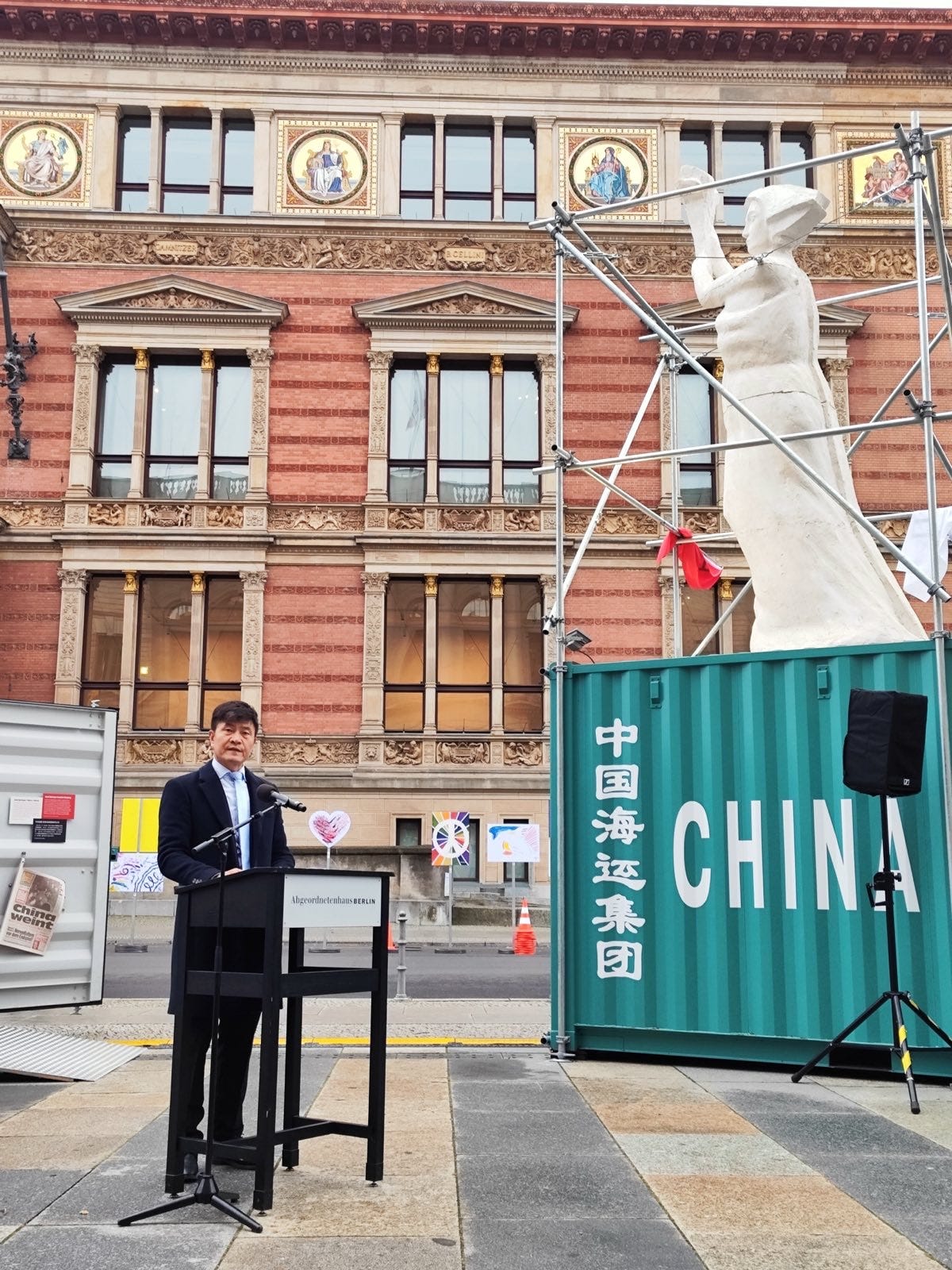Commemorating the 35th Anniversary of the Fall of the Berlin Wall and the 1989 Tiananmen Protests
Zhou Fengsuo reflects on the universal struggle for freedom
On 7 November, Zhou Fengsuo, Executive Director of Human Rights in China, delivered a speech at an event in Berlin to mark the 35th anniversary of the fall of the Berlin Wall, drawing connections to the 1989 Tiananmen Square protests. Hosted in front of the Berlin House of Representatives (Abgeordnetenhaus), the event inaugurated the "China is Not Far" exhibition, which highlights the shared democratic struggles that defined 1989 in both Berlin and Beijing.
The commemoration began with remarks by Berlin House of Representatives President Cornelia Seibald, who noted the commonalities between the authoritarian regimes in Berlin and Beijing at the time. Seibald emphasised that despite the vast geographical divide, protesters in both cities were united in their calls for universal human rights and democratic freedoms. Antje Schippmann from the Axel Springer Freedom Foundation further addressed the audience, underscoring the universal nature of struggles for freedom and dignity.
Zhou Fengsuo, a former student leader from the Tiananmen protests, offered his reflections on the Berlin Wall’s fall and its global resonance. He connected the physical wall that once divided Berlin with the “Great Firewall” that now limits free expression in China, cautioning about the latter's role in restricting information flows and stifling dissent.
After the exhibition’s opening, Zhou joined members of the Berlin House of Representatives as they reflected on the peaceful advocacy that led to the Wall's fall and the reunification of Germany. He also met with Reiner Eppelmann, former GDR civil rights activist and politician.
In his address, Zhou warned against the expanding influence of authoritarianism, noting the CCP’s extensive use of surveillance technology and digital censorship, which have inspired similar practices in other authoritarian regimes. He underscored that, unlike the physical Berlin Wall, this “digital wall” extends across borders, posing challenges to the global flow of ideas and information.
The "China is Not Far" exhibition remains on display outside the Berlin House of Representatives until 11 November, after which it will continue to other locations in Berlin until 10 December.
Read the full speech below ( 后附中文版 ).
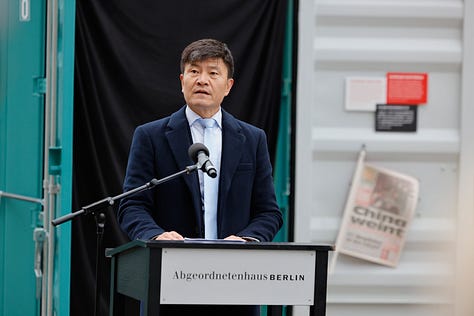
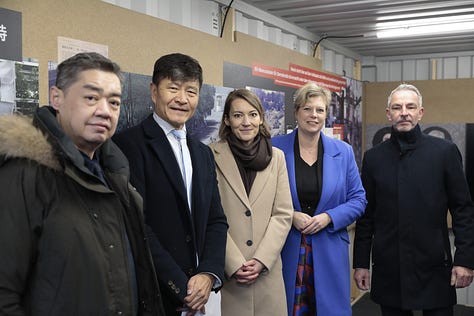
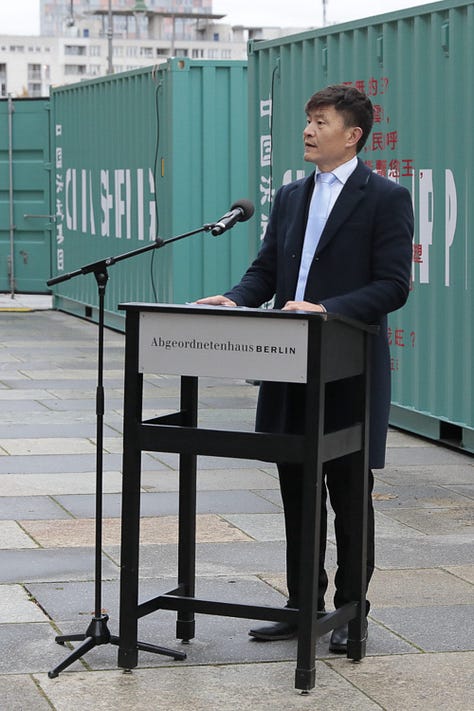
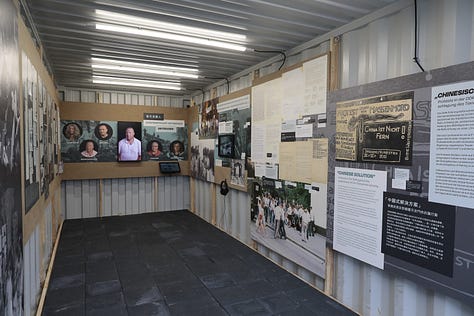
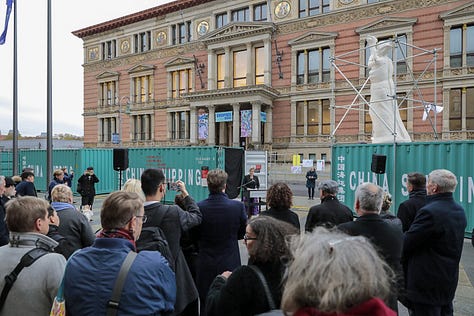
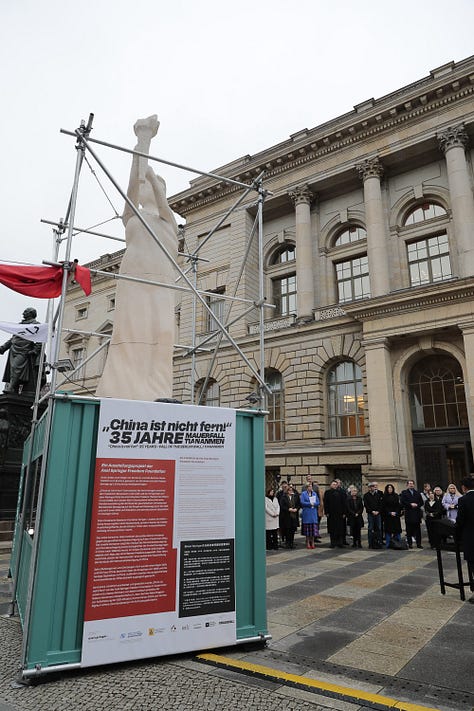
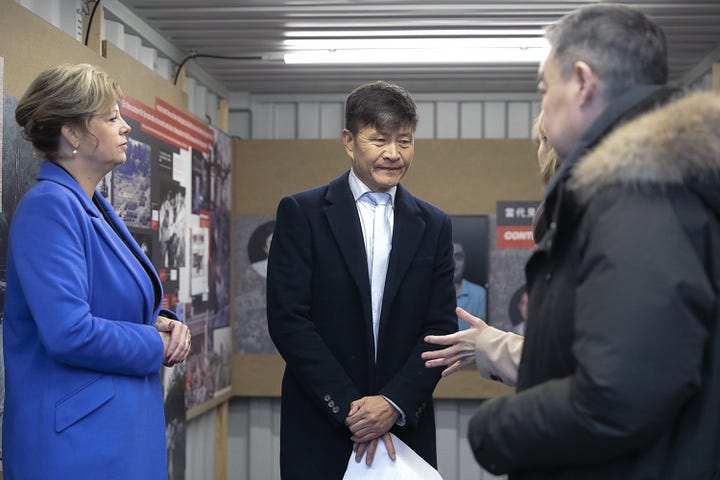
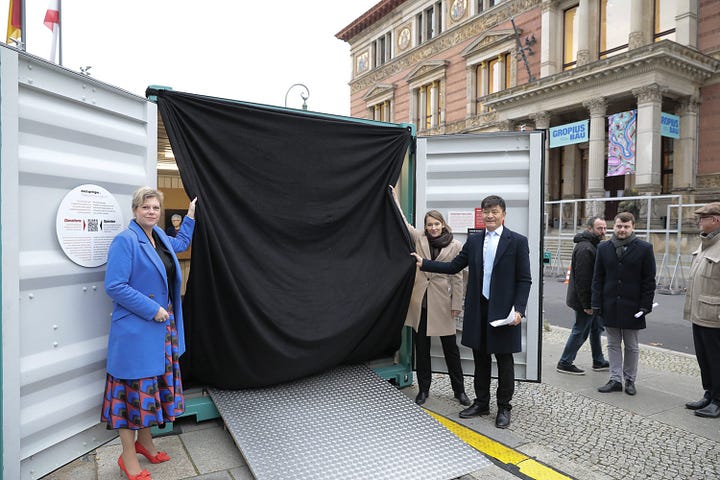
Ladies and gentlemen,
It is with a deep gratitude and sense of purpose that I stand before you today, amidst symbols of resilience and hope, as we mark the 35th anniversary of the fall of the Berlin Wall. First and foremost, I extend my heartfelt thanks to Antje from the Axel Springer Foundation, whose tireless dedication and vision has been instrumental in bringing this exhibition to life. Thank you to Beier and Wellach Projekte, whose curatorial expertise has achieved historical precision and visual power in commemorating the legacies we are here to honor today. Finally, I also wish to thank Cornela Seibeld for agreeing to display this exhibition in front of this historic house.
Here, we are graced by the presence of the Goddess of Democracy, an emblem originally erected by courageous students during the 1989 Tiananmen Square protests. This statue, though destroyed by tanks in Beijing, continues to stand as a universal symbol of freedom and democracy.
The Berlin Wall was not just a physical barrier; it was an embodiment of ideological oppression which divided families, friends, and communities. From its erection in 1961, it became a stark symbol of the Cold War, separating East from West; authoritarianism from democracy. Its fall in November 1989 was a watershed moment—a peaceful revolution that signified not just the reunification of Germany, but the triumph of democratic ideals over authoritarian regimes worldwide.
When I heard of its fall, I was a political prisoner in a high security prison in Beijing, jailed together with other student leaders from the Tiananmen protests. At first, none of us understood what had happened, as the news in China didn’t report the fall of the Wall in an accurate, objective way. When I and the other inmates understood what had happened, the prison cells rang with our cheering.
This was one of the proudest moments in my life—it was a beacon of hope, showing that oppressive regimes could be dismantled by citizens. It showed that the universal desire for freedom cannot be extinguished by walls or chains.
Many years after I regained my freedom, during my visit to the Stasi Museum in Berlin, I was deeply moved to see images of Leipzig protesters carrying banners inscribed with "民主," the Chinese word for democracy. To witness German citizens invoking the same ideals and even the same language we had used in Tiananmen square was profoundly touching. It showed the deep connections between our struggles. The quest for freedom transcends borders, cultures and languages.
Today we must also pay tribute to the victims of the Tiananmen Square massacre, whose bravery in the face of brutal repression remains etched in our collective memory. Tank Man, who stood defiantly in front of a column of tanks exiting from Tiananmen square, has become a global symbol of resistance against tyranny. It is a testament to the power of individual courage in confronting injustice.
In 1989, East Germany faced domestic unrest akin to China's. However, unlike Beijing's violent crackdown, East Germany chose a different path. The fear of a "Chinese solution"—a brutal military response—was palpable. Yet ordinary Germans condemned such violence and demanded ‘not another China.’ Ultimately, their peaceful protests led to the fall of the Berlin Wall.
Today, we face new challenges. The Chinese Communist Party is a formidable force, growing in strength not only within its own borders but increasingly on the global stage. Authoritarianism has evolved, extending into new frontiers through the use of technology. The "Great Firewall" of China suffocates the flow of information, isolating Chinese citizens from democratic ideals and suppressing dissenting voices. Surveillance technologies monitor citizens' every move, creating a digital panopticon which stifles freedom of expression.
Unlike the Berlin Wall, which was a physical barrier confined to a specific geographical location, this digital wall transcends time and space. It represents a new kind of battleground —one which exists in the realm of information and ideas. The CCP's use of technology for surveillance and control has set a troubling precedent, inspiring other authoritarian regimes to adopt similar tactics.
Moreover, the CCP is extending its influence globally, forging alliances with other authoritarian governments including Russia, Iran, and North Korea. This coalition seeks to promote authoritarian values, undermine democratic institutions, and erode faith in democracy worldwide through disinformation campaigns, cyber warfare, and economic coercion. The battle lines are no longer drawn on physical maps but are instead fought in the digital sphere and within the hearts and minds of people around the world.
The lessons from the fall of the Berlin Wall are more relevant than ever. It taught us that walls—whether physical or digital—cannot indefinitely suppress the human spirit's desire for freedom. It showed us the power of peaceful protest and international solidarity. It reminded us that the actions of ordinary people can indeed change the course of history.
We must preserve our belief in the spirit of humanity and the conviction that freedom will prevail. It is incumbent upon us to stand together against the expansion of authoritarianism. We must support those who are oppressed, champion the free flow of information, and uphold the values of democracy and human rights.
As we stand here before the Goddess of Democracy, let us be reminded of the sacrifices made by so many in the pursuit of freedom. Let us honor their memory by continuing their work, by refusing to be silent in the face of oppression, and by striving to bring down the new walls that seek to divide us.
In closing, I urge each of you to remember that the struggle for freedom is a shared journey. The fall of the Berlin Wall was not just a German victory; it was a victory for all humanity. Similarly, the fight against authoritarianism today is not confined to any single nation—it is a global endeavor which requires our collective commitment.
By uniting our voices and our actions, we can challenge the spread of authoritarianism. Together, we must strive to build a world where democracy thrives, where human rights are respected, and where the inherent dignity of every individual is upheld.
Thank you.
女士们, 先生们:
今天,我怀着深深的感激和使命感站在这里,在这象征坚韧与希望的地方,纪念柏林墙倒塌35周 年。首先,我要衷心感谢阿克塞尔·斯普林格自由基金会的安杰,是她的奉献和远见卓识促成了这 个展览。
我还要感谢科内拉·塞贝尔德同意在这座历史悠久的大楼前举办这个展览。 在这里,我们有幸见到民主女神像的风采。这座雕像最初由1989年天安门广场上勇敢的学生们树 立。尽管它在北京被坦克摧毁,但它依然屹立,成为自由与民主的普世象征。
柏林墙不仅仅是一道物理屏障,更是意识形态压迫的化身,它分裂了家庭、朋友和社区。自1961 年建成以来,它就成为冷战的鲜明象征,将东方与西方、专制与民主分隔开来。1989年11月,它 的倒塌象征着和平革命,不仅实现了德国的重新统一,也标志着民主理念在全球战胜了专制政权。
当我听说柏林墙倒塌的消息时,我正与其他天安门抗议活动的学生领袖一起被关押在北京的一座 高度戒备的监狱里。起初,我们都不明白发生了什么,因为中国的新闻没有准确、客观地报道柏 林墙的倒塌。当我们了解事情的原委后,监狱的牢房里回响着我们的欢呼声。
这是我一生中最自豪的时刻之一——它像一座希望的灯塔,表明专制政权可以被公民推翻。它表 明对自由的普遍渴望不会被高墙或枷锁所湮灭。
重获自由多年后,在参观柏林史塔西博物馆时,看到莱比锡抗议者举着写有”民主”的旗帜,我感动 得热泪盈眶。目睹德国公民援引我们在天安门广场使用的同样理想甚至同样语言,这份感动难以 言表。它表明了我们斗争之间的深刻联系。对自由的追求超越了国界、文化和语言。
今天,我们还必须向天安门大屠杀的受害者致敬,他们面对残酷镇压的勇气镌刻在我们的集体记 忆中。坦克人面对从天安门广场驶出的一列坦克毫不畏惧地站立,已成为反抗暴政的全球象征。 这证明了个人勇气在对抗不公中的力量。
1989年,东德面临着与中国类似的国内动荡。然而,与北京的暴力镇压不同,东德选择了一条不同 的道路。人们对”中国式解决方案”——残酷的军事镇压——的恐惧显而易见。然而,普通德国人谴 责这种暴力,要求”不要重蹈中国覆辙”。最终,东德的和平抗议促成了柏林墙的倒塌。
今天,我们面临新的挑战。中国共产党不仅在国内力量强大,在全球舞台上也日益崛起。专制主 义已经演变,通过技术手段延伸到新的领域。中国的”防火墙”屏蔽了信息自由流通,将中国公民与 民主理念隔绝,压制异议声音。监控技术监视着公民的一举一动,创造了一个数字全景监狱,窒 息了言论自由。
与局限于特定地理位置的物理屏障柏林墙不同,这道数字屏障超越了时间和空间。它代表了信息 和思想的全新战场。中共利用技术进行监控和控制,开创了一个令人不安的先例,启发其他专制 政权采用类似策略。
此外,中共正在全球范围内扩大影响力,与包括俄罗斯、伊朗和朝鲜在内的其他专制政府结盟。 这个联盟试图通过虚假信息宣传、网络战和经济胁迫,推动威权主义价值观,破坏民主制度,削弱 全世界对民主的信念。战线不再画在实体地图上,而是在人们的内心与思想中进行。
柏林墙倒塌的教训比以往任何时候都更具意义。它告诉我们,高墙——无论是实体的还是数字的 ——都无法无限期地压制人类对自由的渴望。它向我们展示了和平抗议和国际团结的力量。它提 醒我们,普通人的行动确实可以改变历史进程。
我们必须坚守人类精神的信念,坚信自由终将战胜一切。我们有责任团结起来,反对专制主义的 蔓延。我们必须支持被压迫者,捍卫信息的自由流动,维护民主和人权的价值观。
当我们站在民主女神像前,让我们铭记无数人为追求自由而作出的牺牲。让我们以延续他们的事 业来纪念他们,在面对压迫时拒绝沉默,努力推倒那些企图分裂我们的新高墙。
最后,我敦促在座的每一位记住,争取自由是一个共同的旅程。柏林墙的倒塌不仅是德国的胜利, 也是全人类的胜利。同样,今天反对专制主义的斗争并不局限于任何一个国家——这是一项需要 我们共同承诺的全球事业。
通过团结我们的声音和行动,我们可以挑战专制主义的蔓延。让我们共同努力,建设一个民主繁 荣、人权受到尊重、每个人的尊严都得到维护的世界。
谢谢大家!




